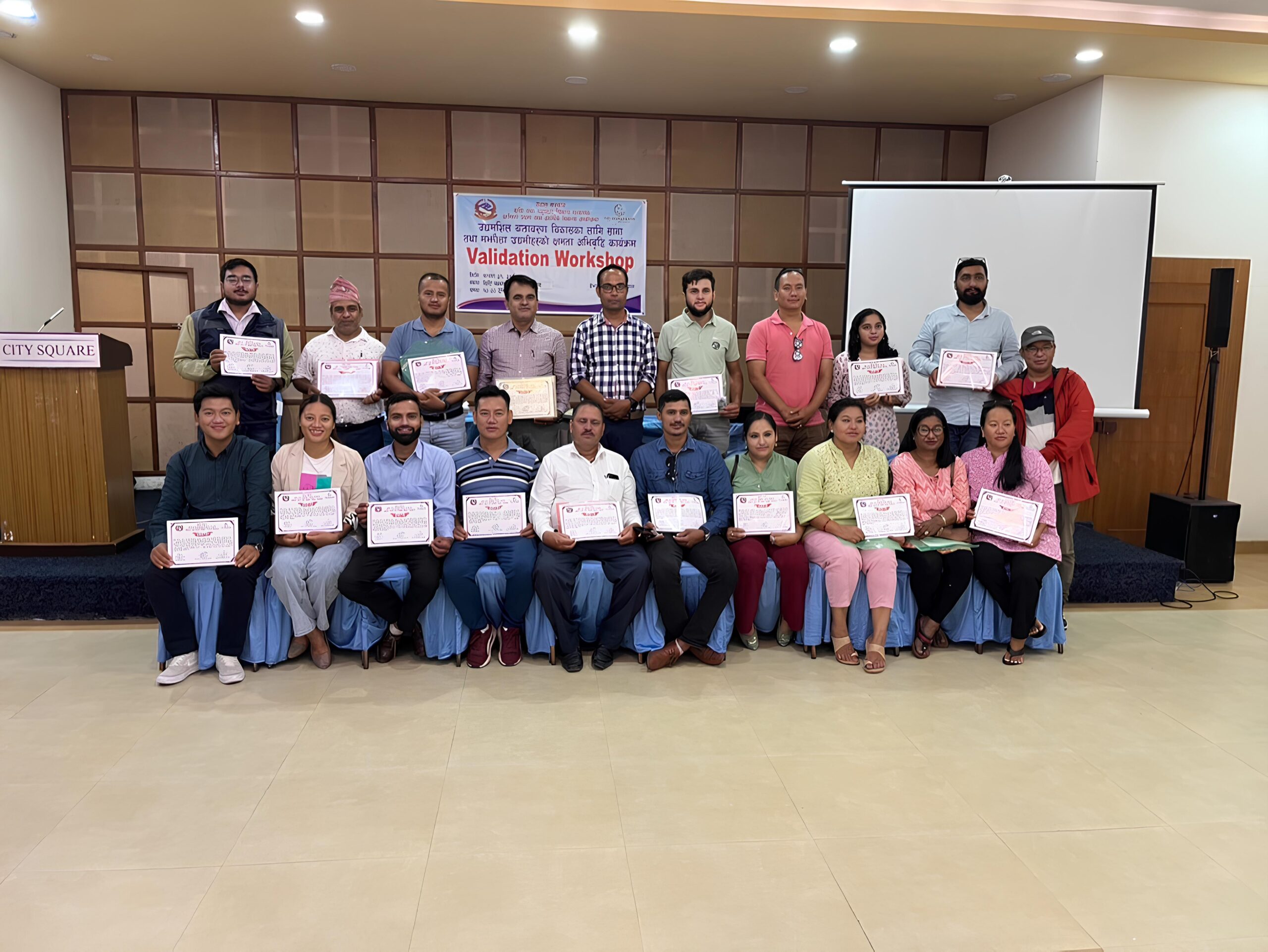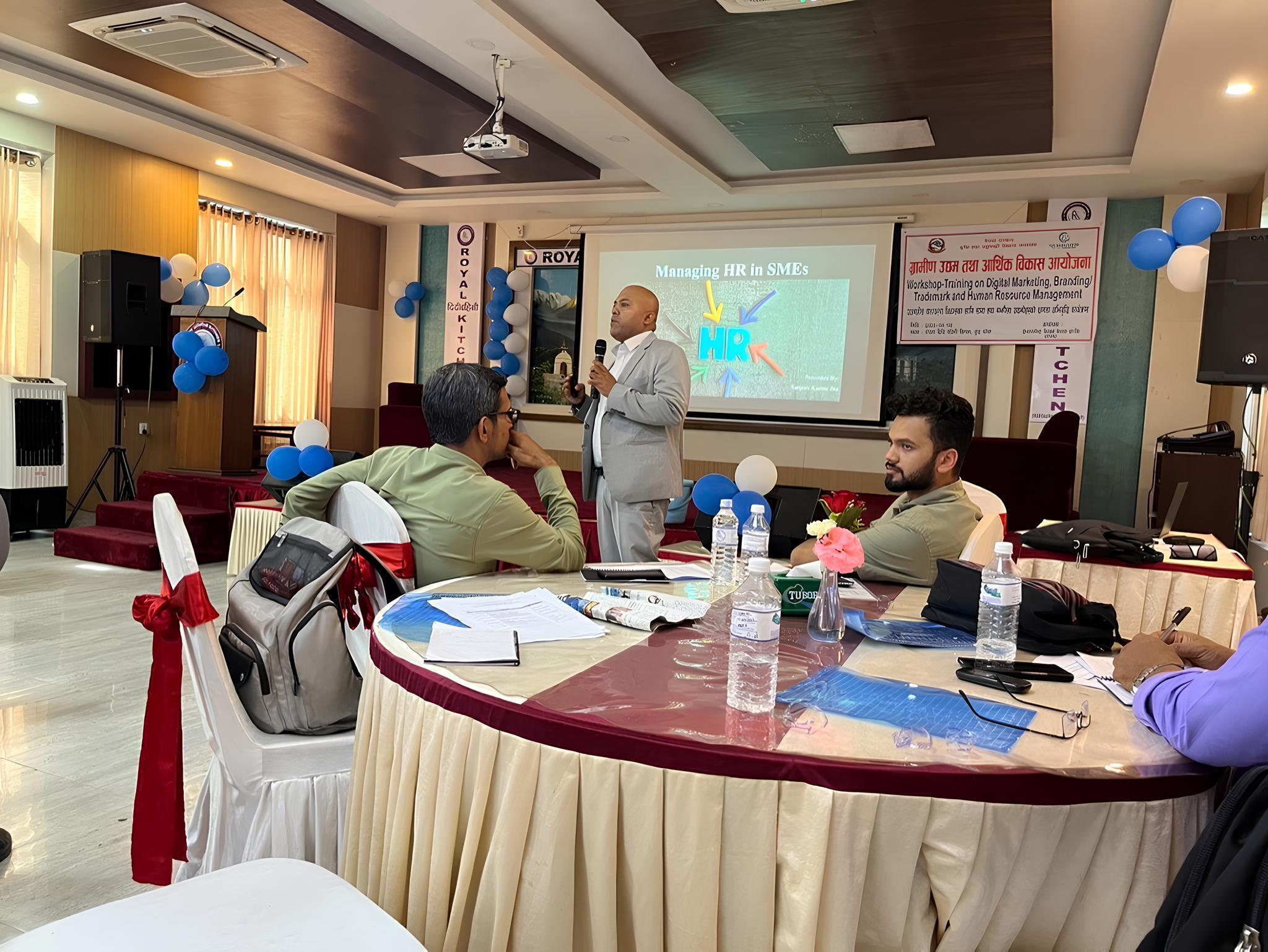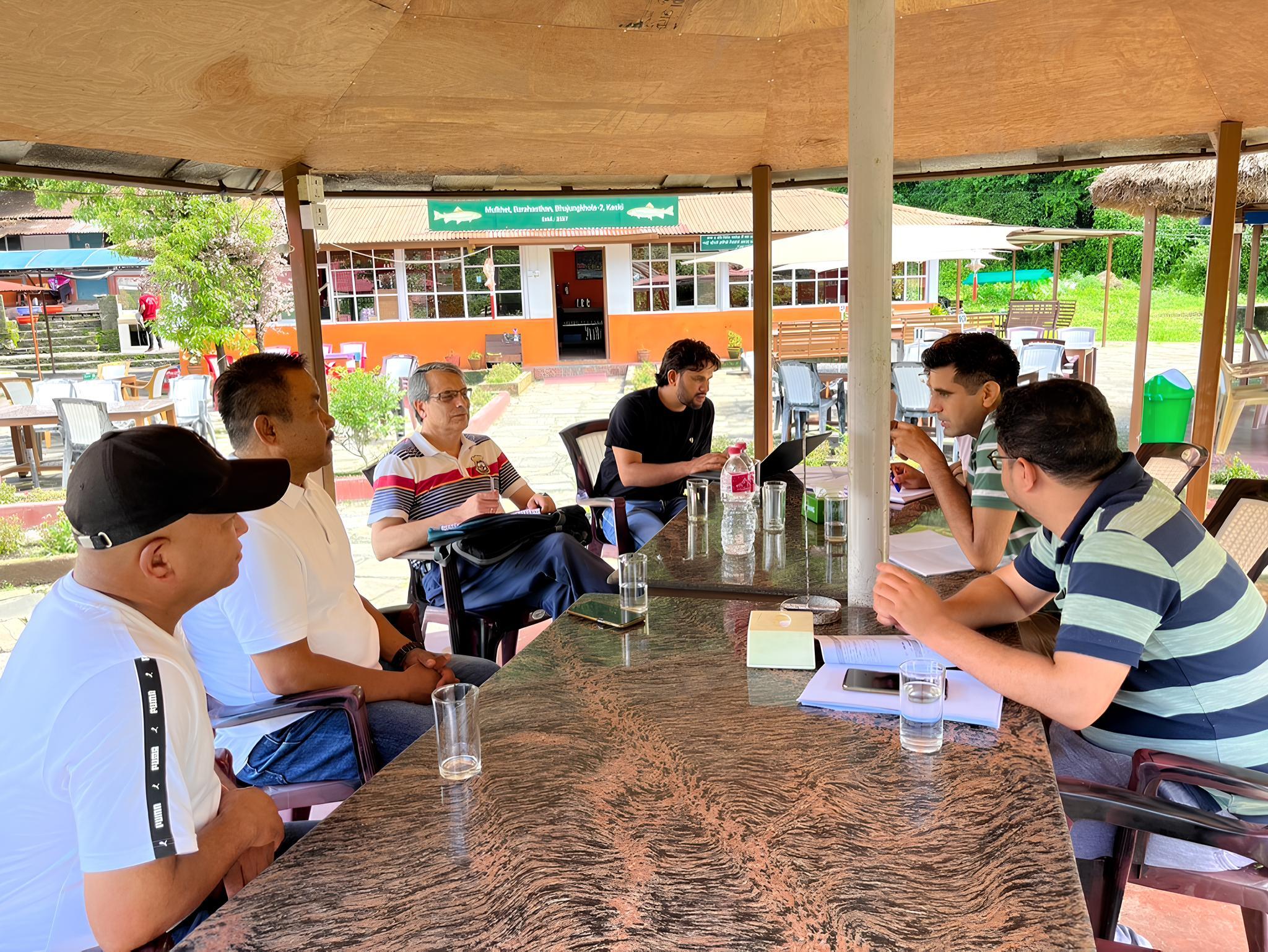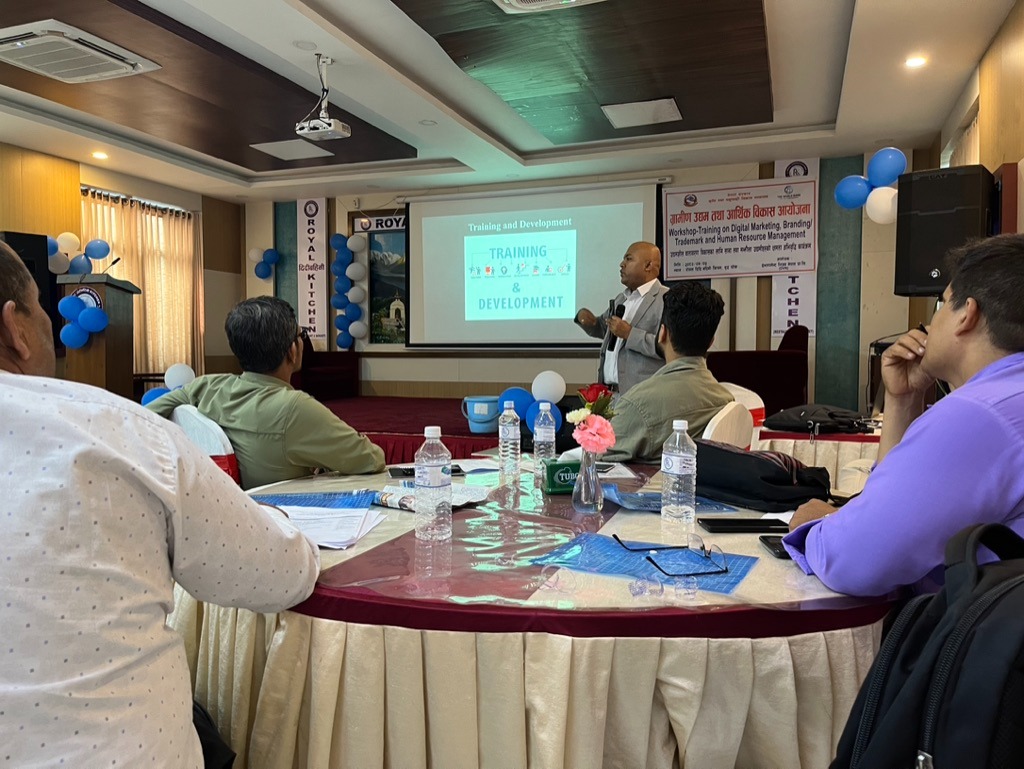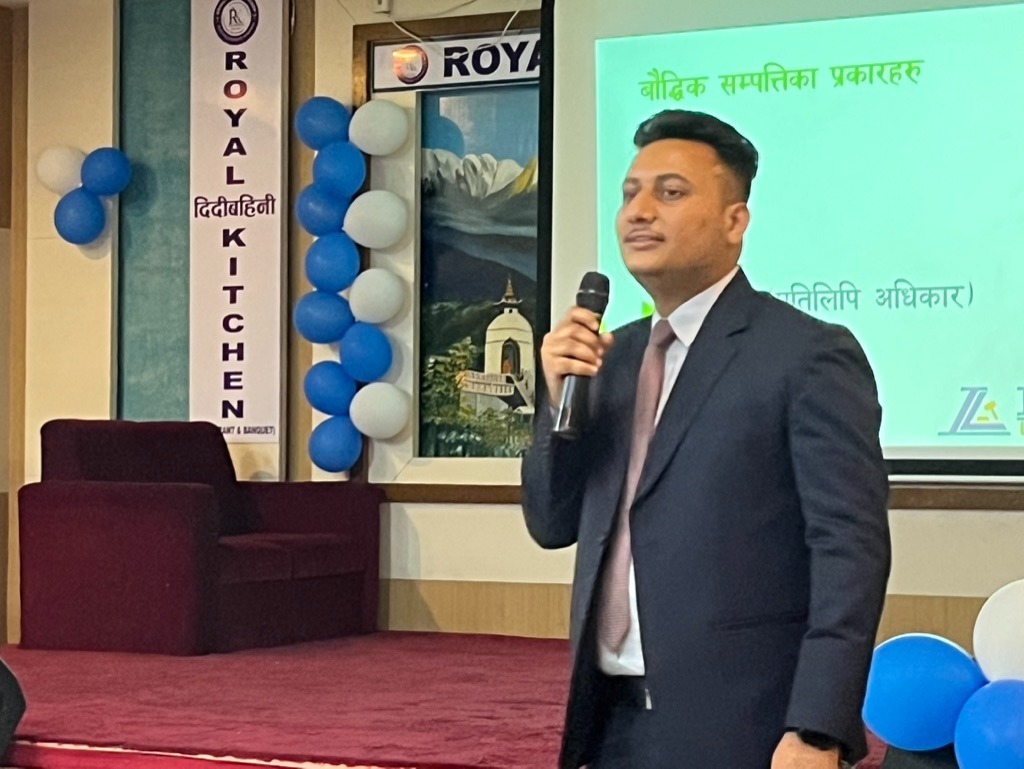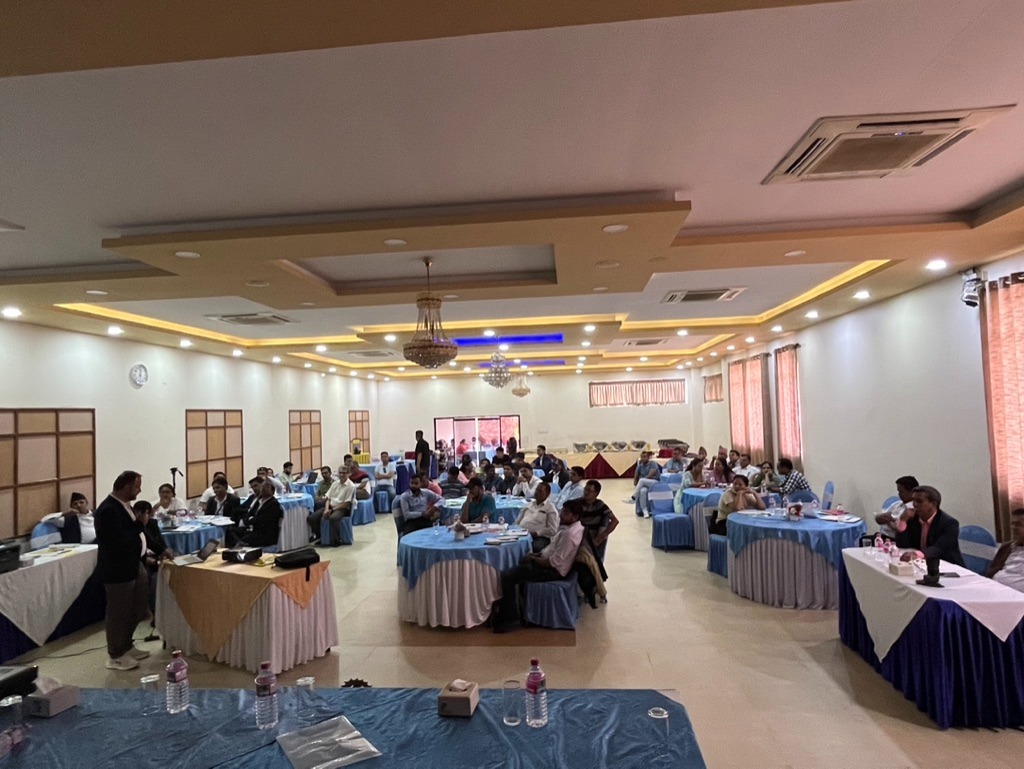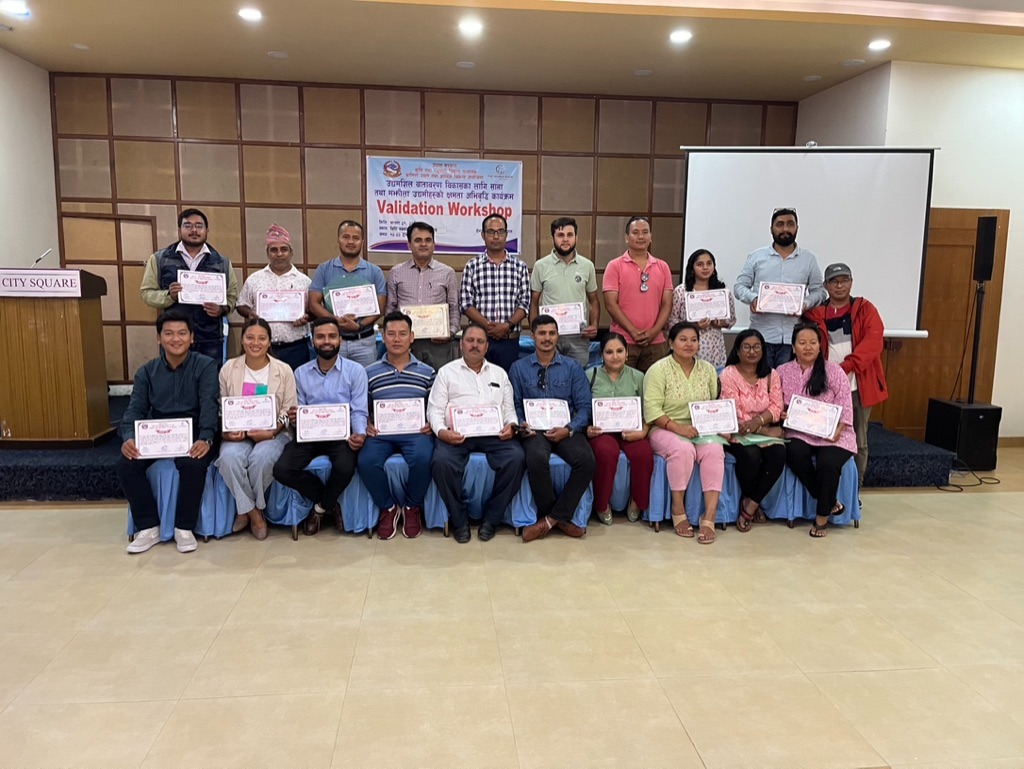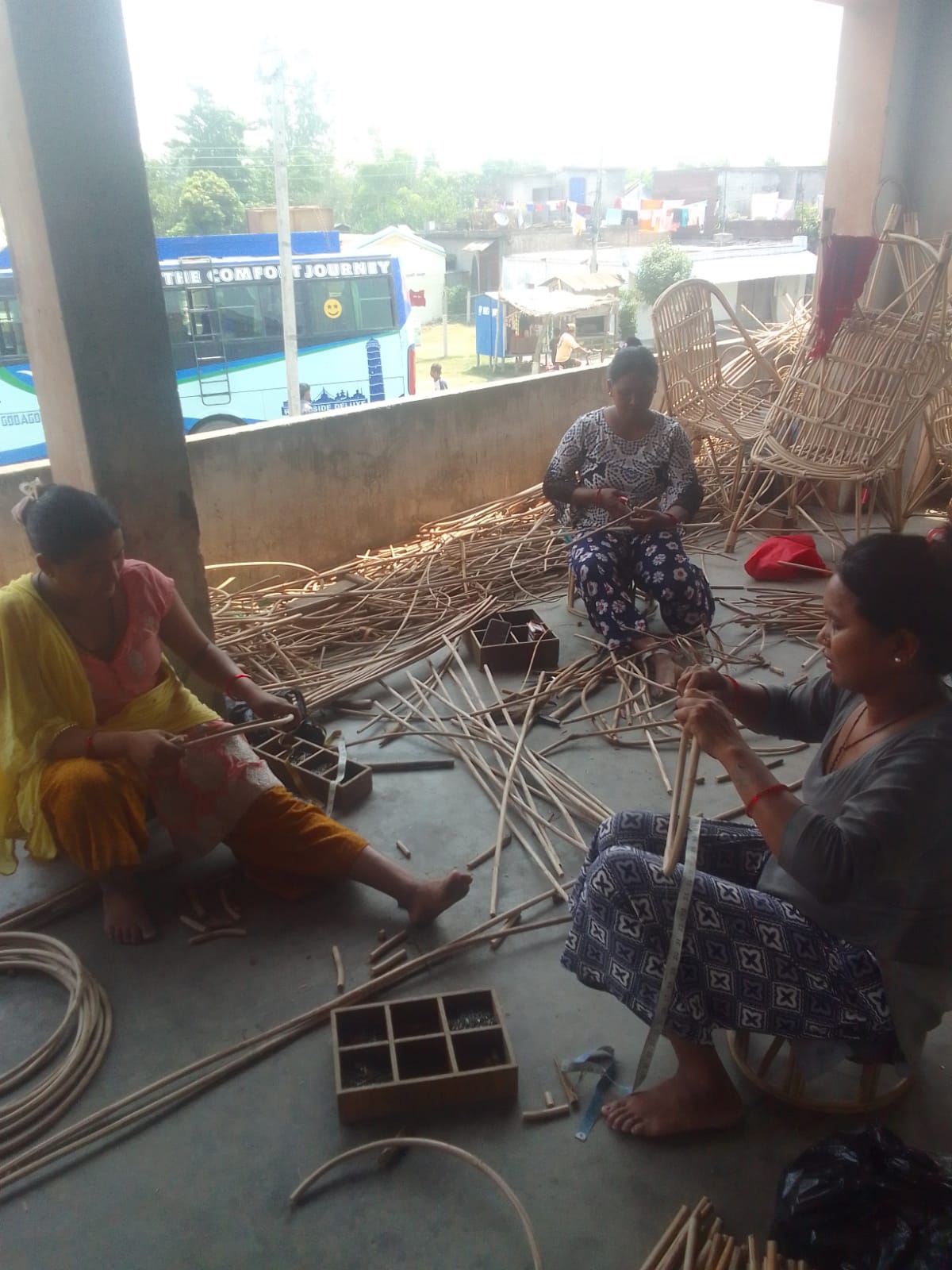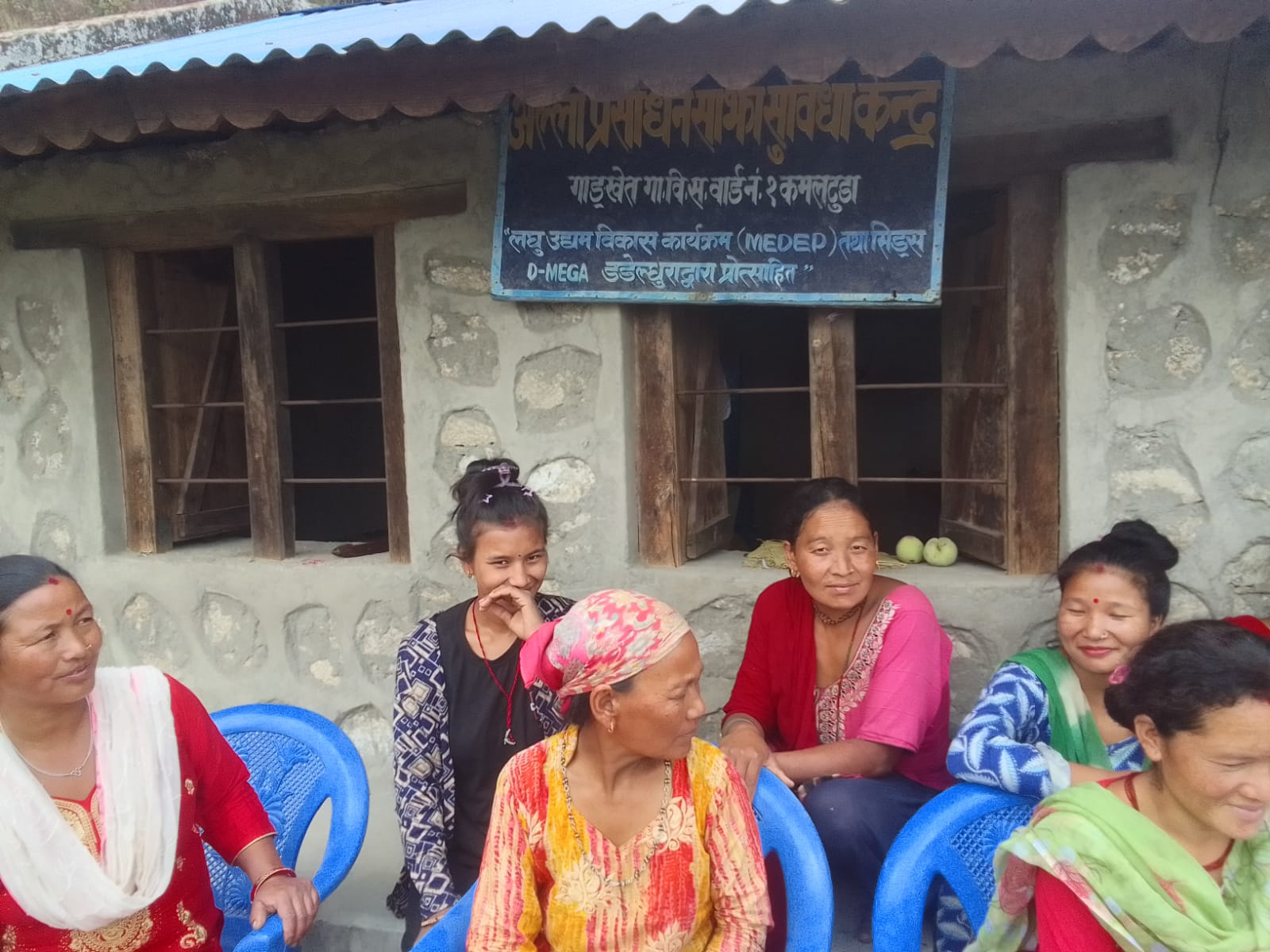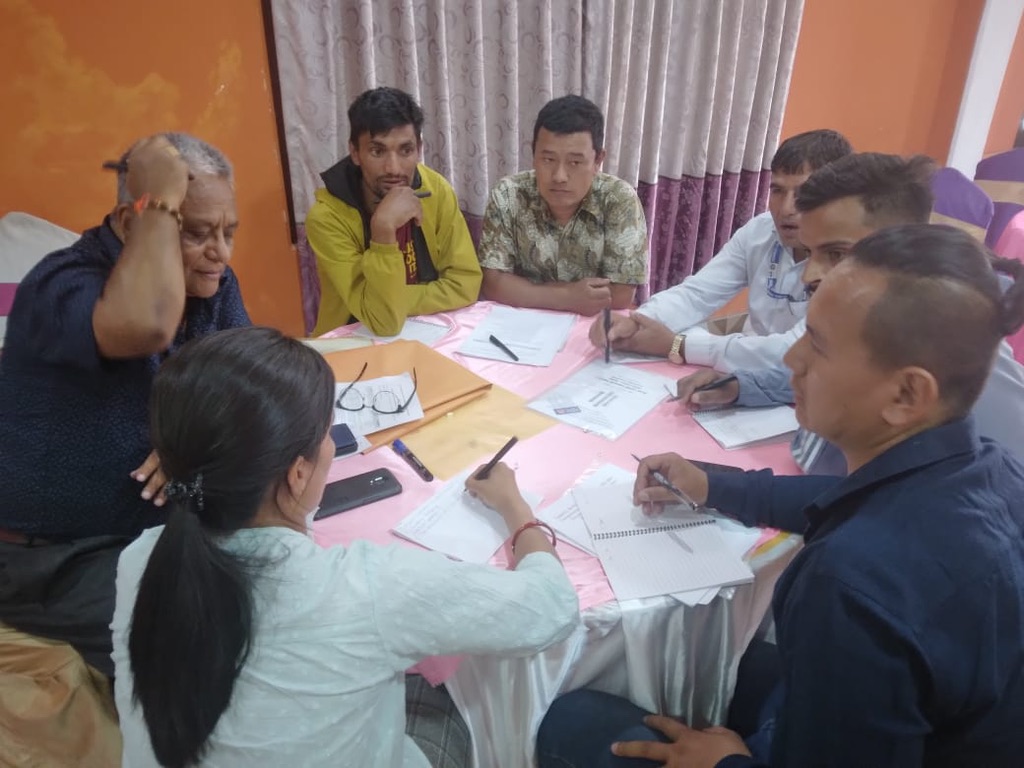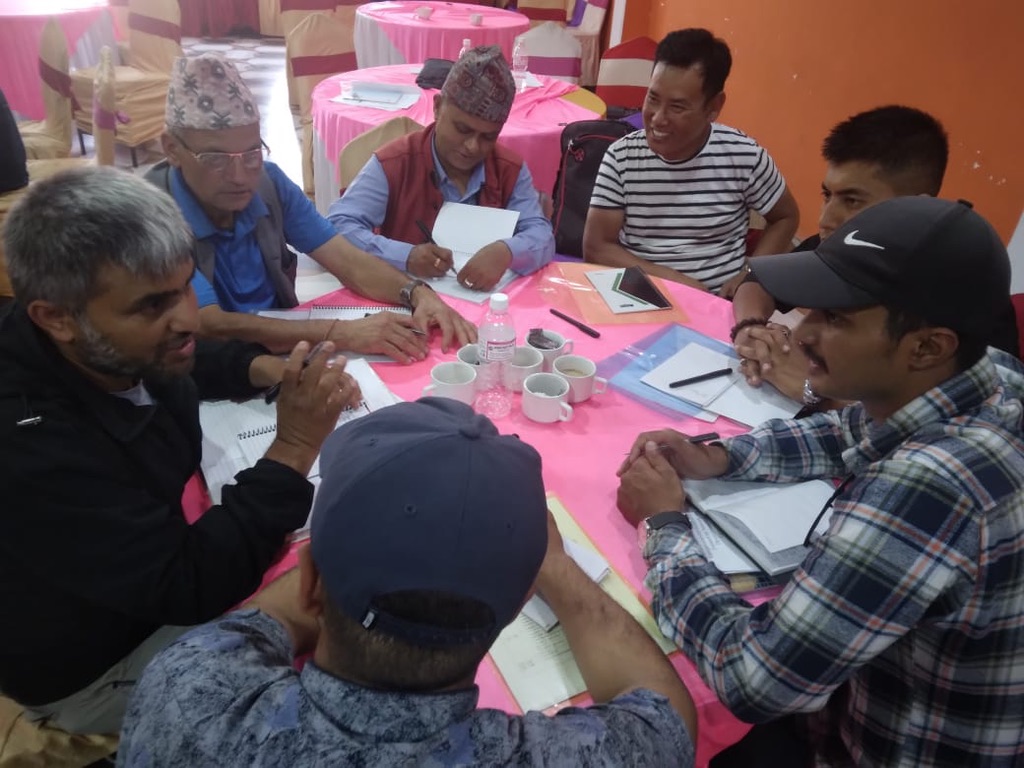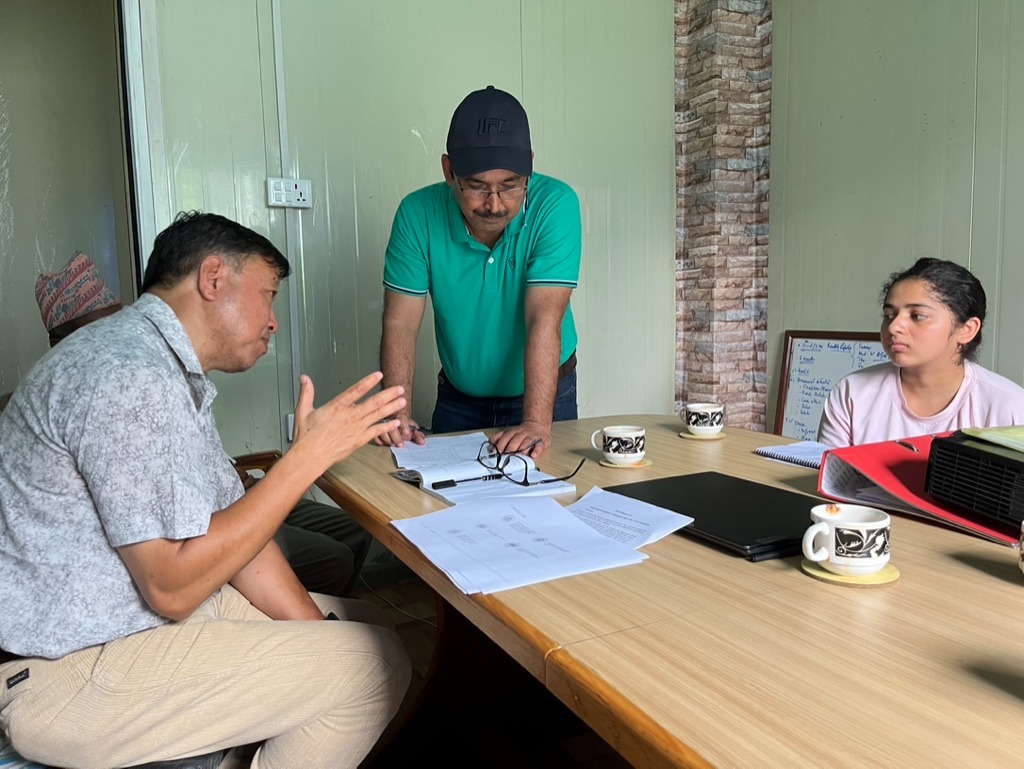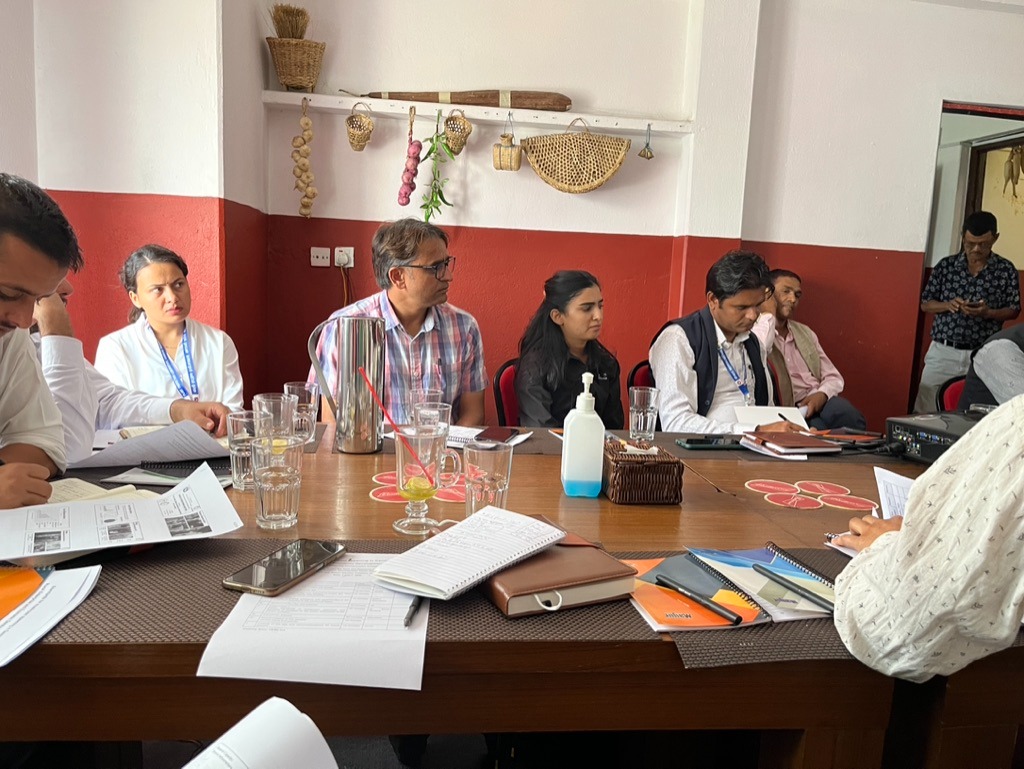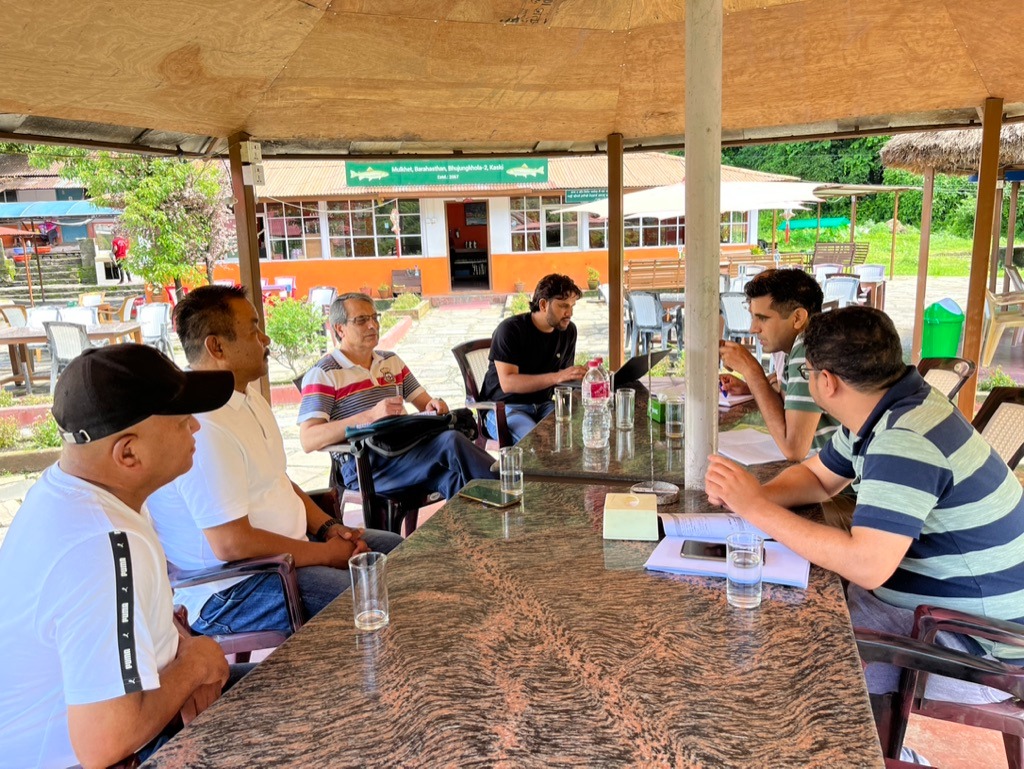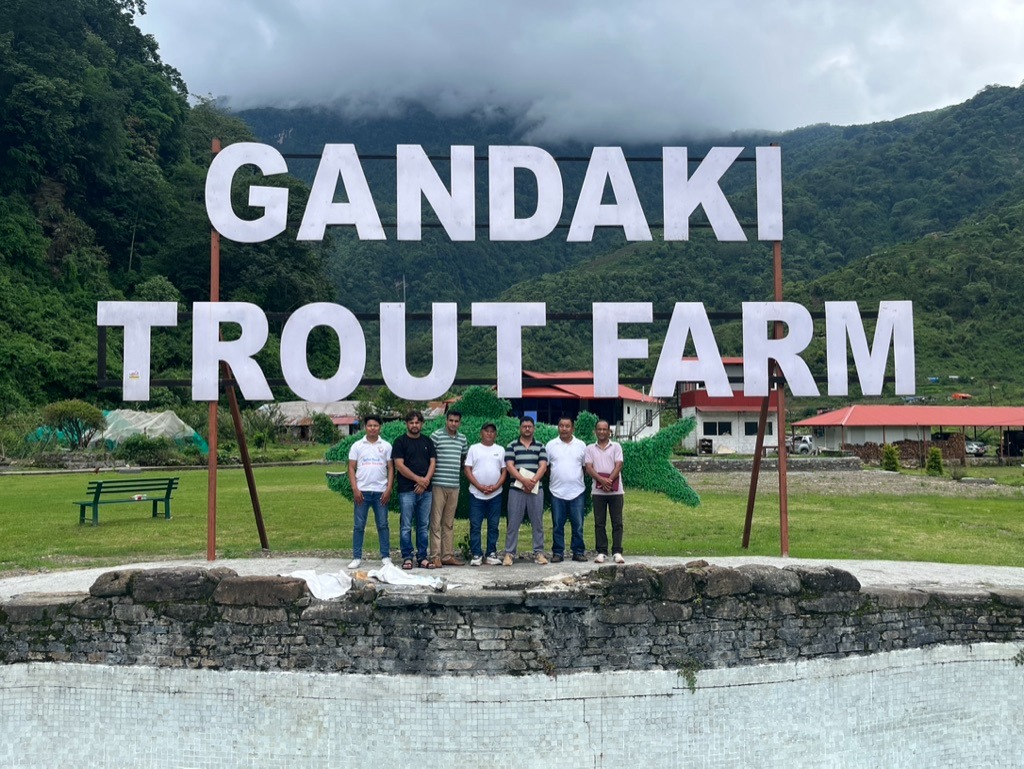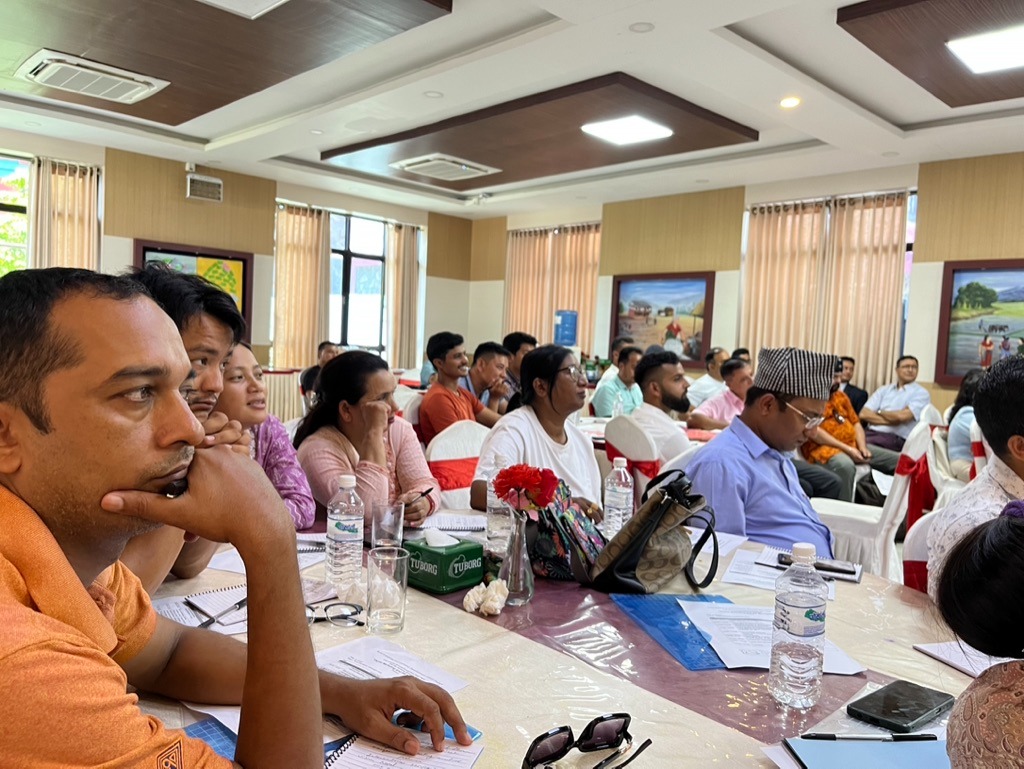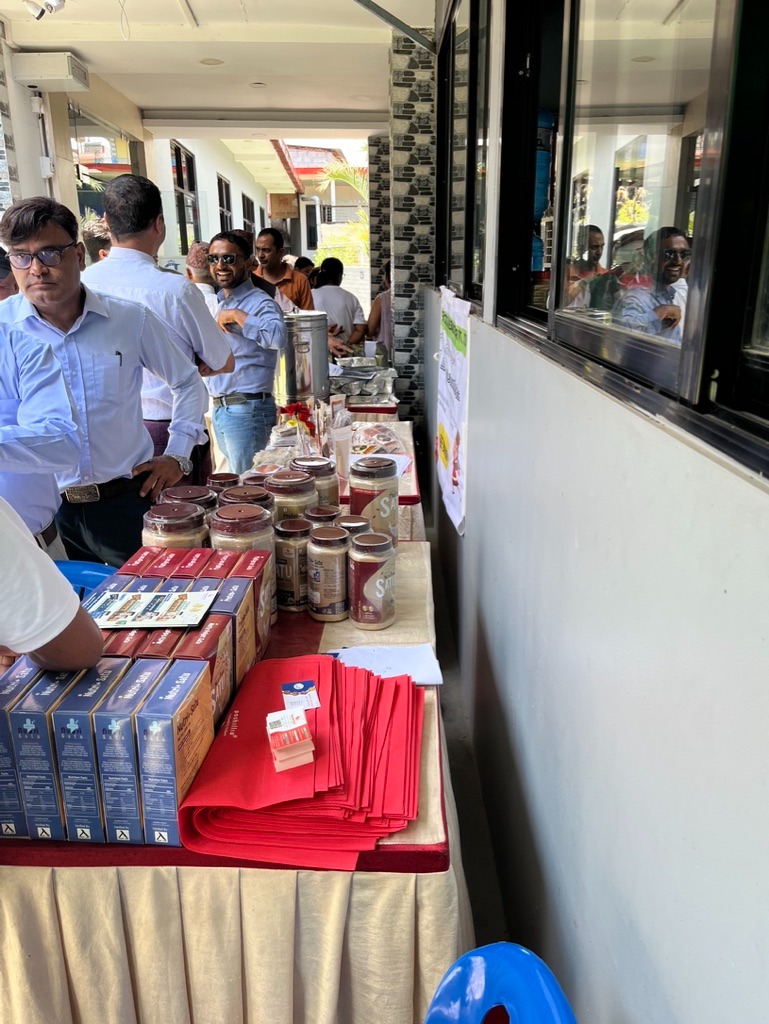|
1.
|
USAID Biodiversity (Jal Jangal): Assessing the Remunerative National, International Markets of Selected Value Chains
|
Conducting an international and national market study on crafts, fiber, medicinal and aromatic plants (MAPs), and essential oils. This includes collecting primary and secondary data to identify and suggest actionable pathways and activities for project interventions.
|
Gorkha, Kaski, Parbat, Bardiya, Banke, Dhangadi, Dadeldhura, Darchula, Surkhet, and Dolpa
|
DAI/USAID Biodiversity
|
May 2024 – Sept 2024.
|
|
2.
|
USAID Biodiversity Livelihood Baseline Study
|
The objective of this assignment was to identify available livelihood opportunities in selected municipalities of six prioritized USAID Biodiversity (Jal Jangal) districts and establish baseline.
|
Gorkha, Kaski, Nawalpur, Bardiya, Surkhet, and Dolpa
|
DAI/USAID Biodiversity (Jal Jangal)
|
Nov 2023 to Jan 2024
|
|
3.
|
Capacity building of SMEs and entrepreneurship ecosystem development
|
Outreach to 100 SMEs and startups, lite-touch business counseling, selection of 25 growth-oriented Agribusiness SMEs and startups; diagnostic study of the selected SMEs, development of mentoring plan and administration of mentoring services to 25 selected SMEs.
|
Kaski district
|
REED/MOALD/WB
|
June 2022 – August 2023
|
|
4.
|
Mid-line Survey of FANSEP
|
Evaluate the performance of FANSEP against the expected results as articulated in the Results Framework
|
Siraha, Saptari, Dhanusha, Mahottari, Gorkha, Dhading, Dolakha, Sindhupalchok,
|
FANSEP/MOALD/WB
|
April 2022 – July 2022
|
|
5.
|
Baseline Study of Forest for Prosperity Project
|
Baseline survey
|
20 districts from Province 2 and Lumbini Province
|
REDD IC
|
January 2021 to Feb 2022
|
|
6.
|
Consulting Service for Technical Assistance to Nepal Livestock Sector Innovation Project
|
The development objectives of Nepal Livestock Sector Innovation Project (NLSIP) are to increase productivity, enhance value addition, and improve climate resilience of smallholder farms and agro-enterprises through market led initiative and innovations forging alliances and cooperation between producers and market actors in selected livestock value chains in Nepal.
(JV partner)
|
Panchthar, Ilam, Jhapa, Dhankuta, Morang, Sunsari, Udayapur (Province 1); Saptari, Dhanusha, Siraha (Province 2); Kathmandu, Kavrepalanchowk, Makawanpur, Chitwan (Province 3); Syangja, Kaski, Mustang, Manang, Tanahun, Myagdi, Nawalparasi – East (Province 4); Rupandehi, Nawalparasi – West, Gulmi, Palpa, Arghakhanchi, Kapilvastu and Bardia (Province 5)
|
NLSIP/DOLS/MOALD
|
2019 to 2023
|
|
7.
|
Inclusion Education Initiative (IEI) – Activity I Diagnostic on Resource Classrooms and Assessment Centers (Contract No. 7196112)
|
The main objective of this assignment was to undertake data collection on the current spread, coverage, and functioning of resource classrooms and assessment centres. Specifically, this assignment intends to establish baseline conditions and services provided; assessment of current practices and potential problem areas; and
provide suggestions to strengthen capacity and services.
|
Nepal
|
The World Bank
|
May 2020 – Dec 2020
|
|
8.
|
Undertaking Baseline Assessment of EbA II
|
Baseline study of ‘Catalyzing Ecosystem Restoration for Climate Resilient Natural Capital and Rural Livelihoods in Degraded Forests and Rangelands of Nepal – EbA II
|
Achham, Salyan, Dolakha
|
EbA II, CCMD/MOFE
|
Jan – March 2020
|
|
9.
|
Detailed Project Proposal for the implementation of Intensive Value Chain Development Program of Vegetable and Fruits in the 13 selected North-South Road corridor of Nepal
|
The overall objective of the assignment is to prepare detail project proposal for the implementation of Intensive Value Chain Development Program of Vegetable and Fruits in 13 selected North-South Road corridor of Nepal. The specific objectives of the task were to assess the present situation and future trends on production potentiality, value chain and marketing of vegetables and fruits in the specific road corridor; to suggest potential locations of vegetables and fruit production, value chain development and resource required; and to prepare strategies for value chain development and marketing of vegetables and fruits in the specific road corridor
|
Across Nepal
|
CAIDMP/DOA/MOALD
|
April -June 2019
|
|
10.
|
Impact Assessment of Integrated Crop and Water Management Program under IWRMP
|
The overall objective of this impact assessment was to assess the impact of the Integrated Crop and Water Management Program (ICWMP) of Irrigation and Water Resource Management Project (IWRMP) with respect to the indicators presented in the result framework. The assignment intended to assess the impact of the project activities that included field based training, farmer field school, livestock shed improvement, seed production, income generation program to attract youth in agriculture and demonstration of off-season vegetables in plastic tunnel, distribution of small farm machinery and capacity building of the technical staff, water users and farmers.
|
Tanahu, Mustang, Dang, Syangja, Salyan, Bardiya, Bajhang, Dadeldhura, Jhapa, Sunsari, Bara, Kanchanpur
|
IWRMP/DOA/MOALD
|
March – June 2019
|
|
11.
|
Provincial economic interdependency for agricultural development
|
Identification of issues and opportunities of agriculture at provincial level
Suggest appropriate structure at provincial level to carry out provincial agriculture function;
|
All seven province
|
DOA/MOALMC
|
May –July 2018
|
|
12.
|
Baseline study for Anakulan-X (BRACED-X) project
|
Baseline survey
|
Kanchanpur, Kailali, Bardiya, Dadeldhura, Doti, Surkhet
|
iDE
|
May – Aug 2018
|
|
13.
|
Market Scan to find out economically promising activities for Young Women Empowerment Projects (YWEP)
|
This survey work will collect and analyze the information on young women’s employment situation in the project areas – where the jobs are, what kind of jobs exist, who are hiring and what kind of skills are needed to get available jobs.
|
Parbat district
|
Plan International
|
Oct 2017 – Jan 2018
|
|
14.
|
Project for Agricultural Commercialization and Trade PACT (IDE Credit 4603-NP and Grant H 486-NP)
|
The project objective is to improve the competitiveness of smallholder farmers and the agribusiness sector in selected commodity value chains in 25 districts supported by the project.
|
25 project districts
|
MOAC / PACT / WB
|
Aug 2011 – Jun 2016
|
|
15.
|
Consulting Services for Conduct feasibility study and prepare business plan to establish common facility centers (CFC) for promoting processing at local level and to conduct feasibility study to strengthen local MAP based processing enterprise/cooperative for production of value-added products.
|
The objective of the assignment is to conduct the feasibility study that entails to cover the review, analysis to suggest appropriate location for CFCs including its viability in terms of technical, economic and social aspects and to prepare Business Plan of the two CFCs as per the project documents and mandates of the project. The third part of the study will be related to identification of the local MAPs based processing enterprises/ cooperatives which seek possibility of strengthening/ upgrading for the production of value-added products.
|
Pyuthan, Dang,
Surkhet, Banke, Kailali and Kanchanpur.
|
INCLUDE / GIZ
|
Oct 2015 – April 2016
|
|
16.
|
Consulting Services for Annual Outcome Survey-2014/15
|
The overall purpose of this study is to assess the annual achievement and RIMS mid-term achievement in respective seven value chains (apple, vegetable seed, timur, off-season vegetables, ginger, turmeric and goat) against the project interventions and provide quantitative and qualitative interpretations on specific indicators as reflected in the project M & E matrix and provide suggestions to the project to improve project’s supports to get the targeted outcomes (Project and RIMS) during the project implementation.
|
The project is being implemented in seven districts (Surkhet, Salyan, Jajarkot, Dailekh, Achham, Kalikot and Jumla).
|
Ministry of Agricultural Development (MoAD) with financial support from International Fund for Agricultural Development (IFAD). The Netherlands Development Organization (SNV) and Agro Enterprise Centre (AEC)
|
Sept 2015 - April 2016
|
|
17.
|
Value Chain study of ten high value crops for Raising Incomes of Small and Medium Farmers Project (quantitative data collection through HONOR 3C Lite)
|
The objective of this study are (i) to review the current status and performance of selected HVC product value chains and establish baseline data/information to facilitate monitoring and evaluation of project activities, and (ii) identify the constraints and opportunities and leveraged intervention areas for project funding
|
Dang, Banke, Bardiya, Surkhet, Dailekh Kailali, Dadeldhura, Doti, Baitadi and Darchula
|
MoAD / RISMFP / ADB
|
June 2015 – April 2016
|
|
18.
|
Policy Study on the Capacity of Smallholders and Landless Rural Poor in Nepal to Manage Risk, Uncertainty and Vulnerability Related to the Effects of Climate Change and Natural Disasters (RFP/FANEP/2014-01);
|
Major objective of climate change related policy study (RFP/FANEP/2014-01) is to develop policy to enable the smallholders and landless poor to manage and adapt to the various uncertainties and risks associated with the phenomenon of climate change.
|
Country
|
Food and Agriculture Organization of the United Nations / IFAD / MoAD
|
Oct 2014 – Feb 2016
|
|
19.
|
Policy Study on the Capacity of Smallholders and Landless Rural Poor in Nepal to Manage Risk, Uncertainty and Vulnerability Associated with Price Volatility, Market Integration and Value Chains (RFP/FANEP/2014-02).
|
The objectives of market related policy study (RFP/FANEP/2014-02) are to gain a good understanding of the varied risks, uncertainties and vulnerabilities associated with the price volatility, market integration and value chains and how the smallholders and landless rural poor are affected by it; undertake policy analysis and propose policy recommendations based on the study with regard to improving the capacities of the smallholders and landless rural poor to manage and cope with the uncertainties and risks caused by the exposure to the effects of price volatility, market integration and value chains; produce a set of recommendations pertaining to policy actions
|
Country
|
Food and Agriculture Organization of the United Nations / IFAD / MoAD
|
Oct 2014 – Feb 2016
|
|
20.
|
Baseline Survey: McGovern–Dole and WFP supported Food for Education (FFE) Program in Nepal
|
The baseline survey aims at collecting data in order to measure specific indicators as per WFP approved Performance Monitoring Plan (PMP) and to derive data for a regression analysis. In particular, data was collected at school level looking at WFP School Feeding performance, and generally at individual/community level on education, food security, nutrition, health, cognitive development and other variables.
|
Ten districts in Nepal: Achham, Baitadi, Bajhang, Bajura, Dadeldhura, Dailekh, Darchula, Doti, Jajarkot, Rukum
|
WFP Asia / Kimetrica Limited
|
May –June 2015
|
|
21.
|
Tracer Study of Short Term Training Graduates
|
The objectives of the assignment are to: (i) measure the labor market outcomes of youth trained through EVENT support under the two modalities (RBST and VBST), and (ii) understand how youth transition from the completion of training to the labor market.
|
Country
|
EVENT / The World Bank
|
Jan –May 2015
|
|
22.
|
Analysing Economic Potentials in Value Chains (Banana, Soapnuts, Leather, Jute, Cotton and Dairy)
|
The purpose of this assignment is to conduct a value chain (VC) analysis including the economic potentials of the following sectors/VC in the particular districts to facilitate the INCLUDE programme to take proper decision-making for selecting the value chain(s)
|
Banke, Surkhet, Dang, Pyuthan and Kailali.
|
INCLUDE / GIZ
|
Dec 2014 – Feb 2015
|
|
23.
|
Annual Evaluation of District Performance of BDSPO and DMEGA by External Evaluators
|
The purpose of the study is to conduct performance evaluation of The Business Development Service Providing Organizations (BDSPOs) and The District Micro-Entrepreneurs Group Associations (DMEGAs) in 13 districts.
|
Jhapa , Morang, Sindhuli, Sarlahi, Rautahat, Mahottari, Dhanusha, Rasuwa, Nuwakot, Dolakha, Ramechhap, Sindhupalchok and Kavre
|
MEDEP / UNDP
|
Nov-Dec 2014
|
|
24.
|
Consulting Services for Annual Outcome Survey (HVAP -CS-1-070/71)
|
The overall purpose of this study is to assess the annual achievement and RIMS mid-term achievement in respective seven value chains (apple, vegetable seed, timur, off-season vegetables, ginger, turmeric and goat) against the project interventions and provide quantitative and qualitative interpretations on specific indicators as reflected in the project M & E matrix and provide suggestions to the project to improve project’s supports to get the targeted outcomes (Project and RIMS) during the project implementation.
|
The project is being implemented in seven districts (Surkhet, Salyan, Jajarkot, Dailekh, Achham, Kalikot and Jumla).
|
Ministry of Agricultural Development (MoAD) with financial support from International Fund for Agricultural Development (IFAD). The Netherlands Development Organization (SNV) and Agro Enterprise Centre (AEC)
|
July 2014 – Feb 2015
|
|
25.
|
Socio-economic Impact Study of Priority Zoonotic Diseases
(Contract Id: ZCP/AH/S/CQS/08)
|
The main objective of this study is to access the socio-economic impact of zoonotic diseases in the mid-term (5 years) and long-term (10 years) context in Nepal developing evidential base for evaluation and development of programs, strategies and interventions to mitigate the zoonotic hazards.
|
All project districts: Country
|
Avian Influenza (Zoonoses) Control Project: Animal Health Component
|
March-April 2014
|
|
26.
|
Raising Incomes for Small and Medium Farmers (RISMF) Project
Trader Mapping Assignment-Field Survey Design
|
The overall objective of this assignment is to map the selected private sector businesses with regards to the RISMFP selected 10 commodities in Nepal and provide analysis their trading businesses, provide conclusions and recommendation to RISMF project.
|
Banke, Bardiya,Surkhet, Dailekh, Dang, Kailali, Dadeldhula, Doti, Darchula, Baitadi.
|
RISMF/ SNV
|
Sept 2013 –Jan 2014
|
|
27.
|
Preparation of Project Implementation Guidelines
|
Preparation of Implementation Guidelines to give Small Grants to the project Beneficiaries, Implementation Guidelines for Social Mobilization, Implementation Guidelines to Establish and Operate Community Grain Banks
|
Country
|
Agriculture and Food Security Project, Gairidhara, Kathmandu
|
Sept 2013 –Jan 2014
|
|
28.
|
Formulation of Control Strategy Plan for Priority Zoonoses (Contract ID: ZCP / AH/S/CQS/-07)
|
The main objective of this study is to formulate the surveillance and control strategy plans for the priority Zoonotic (Avian influenza, Leptospirosis, Brucellosis, Cysticercosis, Hydatodosis and Toxoplasmosis) diseasesin Nepal
|
Country
|
Avian Influenza (Zoonoses) Control Project: Animal Health Component
|
July –Dec 2013
|
|
29.
|
Performance Evaluation of BDSPOs / DMEGAs ( PISU / RFP / 013 / 2013)
|
Performance Evaluation of BDSPOs/DMEGAs by External Evaluators Darchula, Baitadi, Dadeldhura, Kailali, Banke, Bardiya, Surkhet, Dailekh, Kalikot, Jumla Districts.
|
Ten districts
|
Micro Enterprise Development Programme
(MEDEP) / UNDP
|
Sept –Dec 2013
|
|
30.
|
Strengthening Participation and Influence of Poor and Vulnerable Farmers and Fisher-folk in Decision-making Processes related to Food Security Project
|
Base line study of a project with objective of to enhance the participation of people with increased level of knowledge and awareness so as to be able to make their influence in decision making processes related to food security at local, regional and national level through improved service delivery from concerned agencies.
|
Dadeldhura, Dailekh and Surkhet
|
Oxfam Nepal
|
July-Aug 2013
|
|
31.
|
Tracer Study on Technical Skills Development Training Services Launched through the Partner T&Es in 2010.
|
Tracer Study is to understand impact of the technical training programmes on various socio-economic groups including poor and disadvantaged youth as the priority target groups.
|
All project districts
|
Employment Fund Secretariat (EFS) / Helvetas Nepal
|
May –July 2013
|
|
32.
|
Base Line study of High Value Agriculture Project in Hill and Mountain Areas (HVAP)
|
The overall objective of this study is to support the project in establishing baselines for selected RIMS and turmeric, timur, goat, off season vegetable VC specific indicators as reflected in the project log-frame and results chain(s).
|
Ten districts
|
HVAP / SNV / IFAD
|
March - Sept 2013
|
|
33.
|
Multi Stakeholder Forestry Programme (MSFP) Baseline Development
|
The overall objective of this study is to support establishment of the baseline required for the MSFP monitoring framework
|
23 districts of Nepal
|
MSFP/ Service Support Unit (SSU), SDC / DFID
|
Oct 2012 to Sept 2013
|
|
34.
|
TEVT Sub-sector Roadmap-Nepal (TA-7992NEP: skill development project)
|
Identification of future interventions coordinating in view of common framework of contemporary development for a period 2013 to 2022.
|
All Nepal
|
Asian Development Bank
|
June 2013
|
|
35.
|
Analysis of chain efficiency and value chain addition status in CADP project area.
|
The overall objective of this study is to review / analyze the status and performance of key value chains supported by CADP
|
All eleven project districts
|
CADP / MoAD / ADB
|
Dec 2012 to March 2013
|
|
36.
|
Market situation analysis of high value addition status in CADP project area.
|
The major objective of the study is to conduct Market Situation Analysis of HVCs in the Project districts of EDR in the concept of regional marketing corridor
|
|
37.
|
High Value Agriculture Project in Hill and Mountain Areas (HVAP)
|
The overall objective of this study is to support the project in establishing baselines for selected RIMS and apple, ginger, vegetable seed VC specific indicators as reflected in the project log-frame and results chain(s).
|
ten districts
|
HVAP / SNV / IFAD
|
Sept 2012 to Jan 2013
|
|
38.
|
Data Entry, Analysis and Final Report Preparation for Mayagdi and Parbat cluster
|
Data Entry, Analysis and Final Report Preparation for Mayagdi and Parbat cluster
|
Mayagdi and Parbat
|
Ashal Chhimeki Nepal
Mahalaxmisthan, Lalitpur
|
Dec 2012 to Jan 2013
|
|
39.
|
Evaluation of Implementing Partners on their Result Achieved of Area Programme Support Offices.
|
This study is carried out to evaluate the performance of implementing partners on their result achieved.
|
12 MEDEP District
|
Micro-Enterprise Development Programme (MEDEP)
|
Nov-Dec 2012
|
|
40.
|
Impact Evaluation of Cash Transfer Activity in Nepal.
|
The proposed evaluation study was to provide a clear picture of the changes made due to the cash transfer activity in food security, nutrition and livelihood of the beneficiaries’ community.
|
Baitadi, Doti, Dadeldhura and Dailekha
|
UN WFP
|
Nov –Dec 2012
|
|
41.
|
EIG's Vocational Education Training and Employment Services Outcome Tracer Study
|
The purpose of the tracer study is to assess the outcome of EIG's Vocational education training and Employment placement activities beyond the projects' 6 month assessment period.
|
15 Districts
|
Education for Income Generation in Nepal Program (EIG) of Winrock International / USAID Nepal
|
June-Sept 2012
|
|
42.
|
Project completion Report
|
Preparation of PCR of SEP, objectives of which was to promote poverty reduction and stability by increasing engagement in wage and self-employment at the domestic and international labour market.
|
All project districts
|
Skill for Employment Project (SEP)
|
July 2012
|
|
43.
|
Sustainability of TEVT Sector training Programme and Their Results
|
The study aims to explain and extent of sustainability of results emerged from the implemented training programmes.
|
All project district
|
ADB / Skill for Employment Project (SEP)
|
May 2012
|
|
44.
|
Monitoring of the NSTB Outcomes
|
The purpose of the study was to access the performance of NSTB activities and suggest measures for successful accomplishment of outcomes.
|
All project districts
|
The Swiss Agency for Development and Cooperation in Nepal
|
Feb 2012
|
|
45.
|
Guideline for monitoring of EFS Field Programme
|
The Study is to prepare guideline for monitoring training programmes on various socio-economic groups including poor and disadvantaged youth as the priority target groups.
|
All project districts
|
Employment Fund Secretariat (EFS) / Helvetas Nepal
|
2012
|
|
46.
|
Tracer Study on Technical Skills Development Training Services Launched through the Partner T&Es in 2009.
|
Tracer Study is to understand impact of the technical training programmes on various socio-economic groups including poor and disadvantaged youth as the priority target groups.
|
All project districts
|
Employment Fund Secretariat (EFS) / Helvetas Nepal
|
Dec 2011 – March 2012
|
|
47.
|
Resource Survey and Market & MFIs Assessment
|
Resource survey is to explore and analyze local resources required for enterprises with reference to resources quality, quantity, availability and geographical locations
|
Morang and Jhapa
|
The UNDP Micro-Enterprise Development Programme
|
Aug-Dec 2011
|
|
48. 2
|
Study on Increasing Credit Access for Biogas Plants to Hills and Mountains
|
The major objective of this study is to suggest possible ways to increase the credit access to the hills and mountains for the installation of biogas plants
|
The hill and mountain region of Nepal
|
Alternative Energy Promotion Centre (AEPC)
|
May –Aug 2011
|
|
49. 3
|
A Study on Employment Generation, and Income and Nutrition through CLDP Interventions
|
The study makes quantitative assessment of project achievements covering value additions based on value chain approach including benefit cost ratio and net returns of all sample enterprises.
|
Dadeldhura, Kailali, Surkhet, Bardiya, Dang, Kaski, Tanahu, Nawalparasi, Chitwan, Morang
|
FAO/CLDP/Department of Livestock Services
|
June 2010
|
|
50.
|
Baseline Study of GTZ Inclusive Development of the Economy Programme (INCLUDE)
|
The study was carried out representing value – chain enterprises, support institutions & cooperatives. The Experts held several consultations and interactions with different stakeholders involved in various chains of product development and identified niche areas for further research and development.
|
Makwanpur, Rupandehi, Kailali and Palpa
|
GTZ, Nepal
|
April 2010
|
|
51.
|
Impact Study of Poverty Alleviation in Selected Remote Areas (PASRA).
|
The study attempts to capture information on the effectiveness and impacts of the interventions made by the project in the selected communities of mid and far western region.
|
Surkhet, Jajarkot, Pyuthan, Salyan, Baitadi
|
GTZ Nepal
|
December 2009
|
|
52.
|
Value Chain Study of Selected Timber Products in 5 Districts of Mid and Far Western Region, Nepal.
|
The study fully assesses the existing production, marketing and utilization of timber and timber products and examines potential areas for value additions as value chain analysis to promote utilization of timber products linking with industrialization and poverty alleviation in the area.
|
Banke, Surkhet, Kailali, Bardiya and Kanchanpur.
|
Netherland Development Organization (SNV)
|
December 2008
|
|
53.
|
Study on Production and Marketing of the High Value Agriculture (HVA) Commodities and NTFPs
|
The study, through intensive field visits, attempts to assess, examine and identify selected high value potential commodities in the newly developing road corridors and suggests the possible interventions for value additions to exploit full potentiality of these commodities streamlining production, transportation, processing, packaging, storage, marketing etc.
|
Surkhet, Dailekh, Kalikot, Jajarkot and Jumla
|
Netherland Development Organization (SNV)
|
December 2008
|
|
54.
|
Goat Sub-Sector Analysis cum Baseline Study for Establishment of Goat Resource Centers in LFLP
|
The study objectives and findings are focused towards analyzing current goat raising practices and problems in rural Nepal as well as drawing policy recommendations to suggest the establishment of Goat Resource Centre (GRC) in five districts in coordination with the LFLP activities.
|
Kavrepalanchowrk, Gorkha, Tanahu, Makawapur and Salyan
|
DOF / IFAD / LFLP / COCIS
|
July 2008
|
|
55.
|
Evaluation of Jana Awwaj Programme: Promoting People's Participation n the Constitutional Process
|
The study investigates the effectiveness of the programme in terms of area and beneficiary coverage, inclusiveness of beneficiaries, strategies and tools used in the process and overall awareness level of beneficiaries about the Constituent Assembly (CA) and people's participation in CA election.
|
Jhapa, Dhankuta, Rautahat, Dhading, Gorkha, Dadeldhura
|
CECI / Jana Awaaj Programme
|
May 2008
|
|
56.
|
Evaluation of UJYALO Program in Mid and Far Western of Nepal for Livelihood Improvement
|
The study aims at evaluating the overall performance of UJYALO in achieving the set goals and assessing the sustainability at local level with increased capacity of local level organizations in service delivery, good governance and transparency.
|
Doti, Kailali, Surkhet, Banke, Dang, Pyuthan, Arghakhanchi
|
Save the Children US
|
September 2007
|
|
57.
|
Baseline Study of Community Livestock Development Project in 14 Districts including Nutritional Survey of U-5 Children
|
The study attempts to establish the current socio-economic conditions of the households on selected indicators/ sub-indicators by conducting extensive household survey (About 3000 hhs). The information will provide base for comparisons of future project benefits with the pre-project situation of the sample households and also provide information for designing project support interventions.
|
Tanahu, Lamjung, Baglung, Palpa, Arghakhanchi, Gulmi, Nawalparasi, Banke, Bardiya, Surkhet, Doti, Dadeldhura, Kailali and Kanchanpur.
|
CLDP / AsDB, Department of Livestock Services, GoN
|
March 2007
|
|
58.
|
Assessment of Service Delivery by Government Institutions
|
Appraising the service delivery systems in major service sub-sectors with citizen scoring the services using scaling methods based on perceptions. One of the major indicators to be assessed was tangible and intangible costs including corruptions and bribes.
|
Gorkha and Saptari
|
NPC / UNDP
|
December 2006
|
|
59.
|
A Needs Assessment Study on Attaining Millennium Development Goals in Rupandehi District including Health Sector
|
The study assessed the current status of all MDG 8 goals, 18 targets and all indicators based on information available from the concerned line agencies, NGOs/ INGOs and came up with recommendations for required interventions to meet the set targets along with required budget and sources.
|
Rupandehi
|
NPC / UNDP
|
October 2006
|
|
60.
|
SAHAKARYA – External Annual Assessment (EAA): A CECI funded project implemented in 5 districts of far and mid-western development regions.
|
The study was conducted using FGDs with the participant households and also monitoring of activities implemented in the field by local partner organizations. The major areas of assessment were economic development activities; health related activities, improved stoves, improved latrines, safe motherhood; institutional development at the local level; joint planning and coordination, and working under conflict sensitive environment.
|
Baitadi, Dadeldhura, Jumla, Dailekh, Surkhet
|
CECI
|
November 2005
|
|
61.
|
Impact Evaluation of Hills Leasehold Forestry and Forage Development Project (HLFFDP)
|
The twin objectives of the Hills Leasehold Forestry and Forage Development Program are to contribute, reduce the poverty and restoration of the natural eco-system.
|
Kavre, Sindupalchowk, Dolakha, Ramechhap, Sindhuli, Gorkha, Tanahu, Chitwan, Dhading, Makawanpur
|
PRSP / UNDP
|
December 2005
|
|
62.
|
A Study on the Import Substitution of the Carpet Wool in Nepal
|
Situation analysis of the Carpet industry and related sub-sector from the holistic perspective and assess the potential for import substitution in carpet wool production.
|
Consultation with governmental and non-governmental agencies.
|
APPSP
|
Aug 2005
|
|
63.
|
Final Evaluation of Community Radio Support Centre
|
The overall objective of the study was to assess the institutional strength of the community Radio Programme and its impact on the targeted communities.
|
Bajhang, Jumla, Kailali, Banke, Makwanpur and Kathmandu.
|
NEFEJ/CAF
|
Jan 2005
|
|
64.
|
Income Generation for Vulnerable Netuwa Tribe in Nepal through Biodiversity conservation
|
First phase - proposal preparation for implementation with support of UNDP /GEF under & Phase II - provides baseline situation of snake in Nepal along with detailed implementation plan.
|
Chitwan, Nawalparasi
|
UNDP- GEF/ SGP
|
November 2006
|
|
65.
|
Socio-economic Impact Study of Community Ground Water Irrigation Sector Project
|
The Community Groundwater Irrigation Sector Project is a 7 year project of HMG/Nepal co-funded by HMG, ADB and the CIDA in support to the APP's focus to promote STWs in the Tarai.
|
Jhapa, Morang, Rautahat and Bara
|
CCO/CECI/ADB
|
July 2005
|
|
66.
|
Management Plan of Barandabhar Forest Corridor of Royal Chitwan National Park (RCNP), Southern Part
|
Preparation of a realistic management plan for the forest corridor of Barandabhar, south of highway, under RCNP management jurisdiction to promote the area as effective and sustainable corridor for the movement of endangered wildlife mainly one horned rhinos and Royal Bengal Tiger.
|
Barandabhar Forest Corridor and Buffer Zone, Chitwan
|
KMTNC
|
July 2005
|
|
67.
|
Review of Quick Impact Project (QIP) Based on Flexible Social Mobilization Package.
|
The main objectives of the review was to examine the extent to which QIP based on flexible social mobilization package able to address issues of social exclusion and inequality as well as extent of response to meet the immediate needs of poor dalit and women for quick impact in a situation of conflict.
|
Salyan, Pyuthan, Dadeldhura, Kanchanpur
|
UNDP/DLGSP
|
Dec 2004
|
|
68.
|
Process Monitoring of Targeted Programmes (Free Text Book Distribution and National Scholarship Programmes)
|
Assess access to, utilization of and satisfaction with delivery of Free Textbook Distribution Programmes and National Scholarship Programme using appropriate tools and suggest ways to enhance the service delivery.
|
Banke and Doti
|
NPC/UNDP
|
Dec 2004
|
|
69.
|
Baseline study of seven Ujyalo Project districts of Western, Mid-Western and Far-Western regions most affected by conflict.
|
Develop baseline indicators and conduct baseline survey for Ujyalo projects implemented by five Ujyalo partners INGOs coordinated by SC-US.
|
Lamjung, Arghakhanchi, Surkhet, Dang, Pyuthan, Banke, Kailali and Doti
|
USAID/SC-US
|
September 2004
|
|
70.
|
Evaluation of Programmes at the Local Level: A Case Study of Siraha District for Poverty Monitoring in Support of PRSP
|
Comparative assessment of sectoral programmes viz. Education, Health, Drinking Water and Agriculture implemented and managed by government, community, INGOs, NGOs and private sector in terms of efficiency, effectiveness, participation and sustainability.
|
Siraha
|
NPC/ UNDP
|
Dec 2004
|
|
71.
|
District Specific Baseline Study for Seven District of LFP’s in Koshi and Dhaulagiri Zone
|
Prepare Quantitative and Qualitative district specific separate reports for 7 LFP district by processing and analysing data collected by DVN. Two separate reports on process documentation of both quantitative and qualitative surveys were also prepared.
|
Sankhuwasaba, Terathum, Bhojpur, Dhankuta, Myagdi, Parbat and Baglung
|
LFP/ DFID
|
Aug 2003
|
|
72.
|
Baseline and Monitoring Study on Strengthened Governance on Natural Resources and Selected Institutions.
|
Establish the baseline conditions of USAID supported programs under SO-5 (Strategic Objective-5) covering Forestry, Irrigation, Hydropower, Women Empowerment and Institutions. The Irrigation projects studied were: Banganga, Khageri, kamala and Chandra Canal.
|
Dhading, Banke, Bardiya, Kapilbastu, Chitwan, Dhanusha and Saptari
|
USAID, Nepal
|
2002
|
|
73.
|
Training on Participatory Planning and Evaluation (PPME) to the District Officials of TLDP
|
Training conducted to the professionals working in 20 districts under Third Livestock Development Project of HMGN and ADB
|
Professionals of 20 districts working in Third Livestock Dev. Project Kathmandu
|
TLDP
|
2002
|
|
74.
|
Impact Study of Community Health Initiative (CHI) Project with special focus on child and maternal health, delivery practices, antenatal and post natal services
|
To assess the process as well as impact of the Project on three major areas: i) Drinking water and sanitation practices and behaviors ii) Nutritional impact on the women and children, and iii) Impact on Safe motherhood practices among women of child bearing age and their families.
|
Baitadi, Dadeldhura and Jumla
|
CECI/CHI
|
2002
|
|
75.
|
Study on the Impact of CECI/ MARD Project
|
Evaluate the project's impact on three major areas: i) Spill over effect of CECI/MARD beyond its project pockets ii) Extent of increase in the household incomes of the participating households as a result of project interventions, and iii) Impact of project on the socio-economic status of women and gender relations in the family.
|
Surkhet and Dailekh
|
CECI/MARD
|
2001
|
|
76.
|
Study on Socio-economic Impacts of Micro-hydro and Effectiveness of Women's Participation in its User's Groups
|
Assess the impact of micro-hydro and effectiveness of women's participation in the entire process of project implementation
|
6 hill and mountain districts.
|
WECS
|
2001
|
|
77.
|
CBED's Impact on Women's Socio-economic Status and Gender Relations in the Family.
|
Evaluates the success of project in 3 major areas of project strategic interventions: i) Participation of women in the program ii) Decision making roles of women due to participation in project, and iii) Access and control over economic opportunities and resources such as technology, credit, market etc.
|
Dadeldhura, Jumla and Baitadi
|
CECI/CBED
|
2001
|
|
78.
|
Design and Development of Impact Assessment and Monitoring Systems for Rural Urban Partnership Program UNDP
|
Aims to exploit opportunities of production and marketing of different products aiming towards poverty reduction of poor people by involving them actively in the process.
|
Tanahu
|
UNDP/ RUPP
|
2000
|
|
79.
|
Baseline Study on Expansion of Economic Opportunities for Women (EEOW) Project
|
Document the socio-economic, empowerment and overall status of participating women in the three districts of Nepal as follow up program of Bezing Conference to support programs for women's social and economic empowerment.
|
Nuwakot, Dhankuta and Nawalparasi
|
ILO
|
2000
|
|
80.
|
PRA and M&E Training to Staff at Bagmati Watershed Management Programme
|
Facilitate the implementation of Bagmati Integrated Watershed Management Program in the five districts belonging to the Watershed area.
|
Sindhuli, Lalitpur, Makawnpur, Kavrepalachowk
|
BIWMP
|
2000
|
|
81.
|
Organizational Study of Bhattedanda Ropeway and its Extension
|
Assess the existing organizational and functional mechanism of the ropeway in Bhattedanda.
|
Lalitpur
|
BIWMP
|
1999
|
|
82.
|
Micro-finance Hill Model Study
|
Explore viable micro-finance model to help augment economic activities of the poor people in the hill districts of the country. The study would be carried out covering institutional, financial, social and other aspects of hill communities that are essential for the success of micro-finance activities.
|
Bajhang, Makawanpur and Bhojpur
|
PLAN International
|
1999
|
|
83.
|
Preparation of Irrigation Policy Working Procedure
|
Development of a working procedure of Irrigation Policy, 1993, Nepal. The objective is to facilitate to all those involved in the implementation of irrigation projects to follow uniform practices in understanding, defining and implementing the clauses mentioned in the Policy document.
|
Nepal
|
Department of Irrigation
|
1999
|
|
84.
|
Design of Perspective Plan for Humla District
|
Develop appropriate strategies and programs for intervention in Humla District where the prevailing socio-economic and difficult physical conditions have persistently threatened the livelihood of local people.
|
Humla
|
Kaushila Foundation
|
1998
|
|
85.
|
Community Development Group Registration Study
|
Improving watersheds in different districts of the country.
|
Dhading, Nuwakot, Dhankuta
|
Nepal Denmark Watershed Management Project
|
1998
|
|
86.
|
Evaluation of Women's Economic Empowerment (WEE) Project
|
Empower women by helping them to improve their social and economic conditions.
|
Surkhet, Dailekh and Nuwakot
|
CECI, Surkhet Project Office
|
1998
|
|
87.
|
Literacy Survey of 5000 PLAN Families in 8 PLAN Program Districts
|
Undertaken to understand the literacy status of PLAN Families in its Program Districts.
|
Bhojpur, Morang, Sunsari, Bara, Rautahat, Makawanpur, Banke, Bajhang
|
PLAN International
|
1998
|
